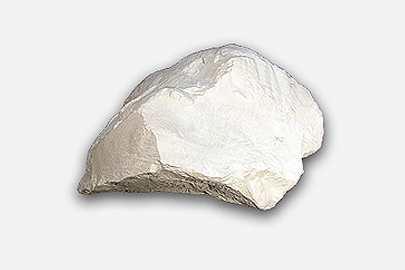Kaolin is a rock from which the clay mineral kaolinite is derived. This one has been used for millennia as the principal ingredient in porcelain tableware. Today, Multi Mineral Processing kaolins bring critical properties to a host of end applications ranging from paper to paints, fiberglass to cosmetics and pharmaceuticals.
China clay
Kaolin, or ‘china clay’ as it is commonly called, is a hydrated aluminum silicate crystalline mineral formed over many millions of years by the hydrothermal decomposition of granite rocks. Hydrous kaolin is characterized by its fine particle size, plate-like or lamellar particle shape, and chemical inertness. Metakaolin is manufactured by the calcination of kaolin to form an amorphous pozzolanic white mineral additive for use in cement-based products. Calcined Kaolin is an anhydrous aluminum silicate produced by heating ultrafine natural kaolin to high temperatures in a kiln. The calcination process increases whiteness and hardness, improves electrical properties, and alters the size and shape of the kaolin particles.
Multi Mineral Processing offers a wide range of innovative and sustainable engineered kaolin-based solutions to help optimize customer performance within industries as diverse as ceramics, cosmetics, paper and packaging, paints, pharmaceuticals plastics, and rubber.
Kaolinite is a silicate clay mineral with the chemical composition
Al2Si2O5(OH)4.
Physical properties
- High brightness
- Non-abrasive
- Naturally fine particles
- Refractory, remains white after calcination
- Weak conductivity (heat and electricity)
- Hydrophilic and easily dispersed in water
Process enabler and performance enhancer
In papermaking and fiber-based packaging, Imerys kaolins bring improved surface functionality when used as fillers or coating pigments enabling papermakers to cut costs and foster more sustainable processes. Kaolins impart gloss, smoothness, printability, and improved barrier performance in paper and packaging applications.
Kaolin is a majority component for the ceramics industry, where its high fusion temperature and white firing characteristics make it particularly suitable for the manufacture of sanitaryware, tableware, wall and floor tiles, and refractories. It is an essential ingredient in ceramic catalyst supports and diesel particulate filters used for emissions control in the automotive industry.
Used by women since time immemorial in cosmetics, kaolins, such as those from our Multi Mineral Processing cosmetics range, are 100% natural ingredients for face creams, face masks, and make-up where they are appreciated for their superior matting and sebum and impurities absorption.
In the construction industry, Multi Mineral Processing kaolins, metakaolins, and calcined kaolins are used to improve the mechanical properties, porosity, and appearance of various types of concrete and cement. Kaolin provides an excellent alumina source for the production of fiberglass.
Used in decorative paints formulations, it is an excellent natural opacifier and partial replacement for titanium dioxide, and ideal for use when high gloss is required.
Multi Mineral Processing engineered kaolins are also used as multi-functional fillers to enhance the performance of adhesives and sealants, plastics and rubber.
Multi Mineral Processing has in-depth knowledge of how kaolin interacts with its customers’ end products. Working closely with clients, we will continue to find value-added, kaolin-based solutions to help them enhance performance, reduce costs and minimize their carbon footprint.

